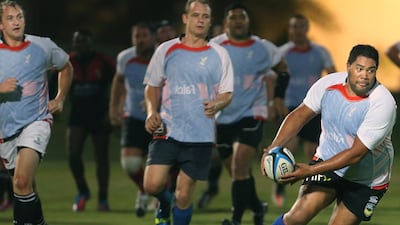Two years ago, when the co-founders of Abu Dhabi Saracens were hatching their plan for the future of their new club, it may have looked something like this.
Year 1: Earn promotion to the top flight of domestic rugby union and offer a viable alternative to Abu Dhabi Harlequins, who have a monopoly on the sport in the capital.
Year 2: Cement our place in the first tier, while maintaining a healthy second XV, too.
Year 3: World domination.
Why not think big? It may be stretching the truth to think the third point is going to be achieved anytime soon, even if the first team did manage a draw with Doha in their final preseason friendly on Friday.
But the capital’s youngest club will start their second season in the UAE Premiership this weekend knowing they have supporters around the world looking out for them.
During the summer, Abu Dhabi’s Saracens signed an agreement to join a global network of eight clubs under the umbrella of the London-based professional club of the same name.
As such, the capital outfit are set to have affiliates wearing the same colours and sharing the Saracens name in the United States, Brazil, China, UK, Malaysia, Tonga and Russia.
“We have a sense of belonging now,” said Dave Jackson, the president, who co-founded the club with Brett Bowie in 2011.
“When the idea of the global network was presented to us, it was an exciting time, because when we tried to establish the club here we faced a long road trying to get players just for one team.
“We managed to get promotion to the Premiership in our first season, then we had to fill the first team and second team. Now we want to get respect for what is going on in the community.”
Their imprint on the local rugby community could be helped significantly by the new deal.
Until now, Saracens have struggled to scratch the surface at youth-team level, given how mature the junior set-up is at their city rivals, Harlequins.
However, they now have a valuable incentive with which to lure young players. Every year, one or two of the top young players will be guaranteed a trial at the London club’s academy.
If they impress, there is the chance of a permanent place there and the possibility of professional terms at a club who won the English Premiership two seasons ago.
It is not a unique proposition.
For example, Iziq Foa’i, who plays for the Quins, will be welcomed back to the London Harlequins academy when school commitments permit, after impressing at a summer trial.
It is, however, an enticement that Saracens did not previously have. Furthermore, their senior players will benefit from tutelage from the London club’s paid coaching staff at least twice per year.
All of which is great for the Abu Dhabi club, but what do their English associates get out of it?
Why the UAE, given that the oval ball remains something of a niche sport here?
“As a club we like to be innovative and forward-thinking,” said Alex Bate, the manager of Saracens Global Network.
“Our view is that rugby is set to go through a phase now where there is huge potential for growth because of some key events. The World Cup in England will be the biggest ever. Most significantly, we have rugby in the sevens form going into the Rio 2016 Olympics, which is opening up rugby to a whole new market.
“Some very powerful new economies like Brazil and Russia are starting to put some serious funding into the sport, because they want medals.
“We see a big opportunity and we want to be at the forefront of it.”
Bate and Ed Griffiths, the London club’s chief executive, flew to Abu Dhabi on Sunday night after seeing Saracens beat Bath in the English Premiership.
For that fixture, Griffiths had the idea of offering any supporter with a Bath postcode a rebate on their admission fee if Gavin Henson, the celebrity rugby player and former Saracen, scored a point.
He did not.
It was the latest ploy to drive attendance, and thus revenue, by a club who are financially aware – hence their bid to lay down a marker in Abu Dhabi.
“Some sports brands, such as Manchester City, spend money aligning themselves with top clubs in America, for example,” Griffiths said.
“We are able to do this because there is a big wave coming through rugby and we want to align with top clubs in major developing economies.
“Abu Dhabi seemed a natural partner because it has this passion for sport. We want to build on the foundations Dave Jackson has laid.”
Although UAE participation in any Olympics sevens tournament is likely to be a pipe-dream for some while yet, Griffiths hopes the global network of Saracens clubs will be well represented at the Games.
“We want to provide as much support as we can to these clubs,” Griffiths said.
“The ideal would be to have maybe 50 Saracens players representing their respective countries in the Rio 2016 sevens tournament.
“By doing that, we will have developed something far more interesting than just a quirky little club in North London, we will have coverage around the world and impact positively on hundreds of thousands of people.”
Team profile
Coach Steve Botha
Captain Lele Tusitala
Key player Dougie Steele. The Scottish fly-half remained at Saracens despite being courted by some of the Dubai clubs in the summer.
In a nutshell They have made remarkable strides off the field in just over two years as a club, now the first team want to make a mark, too.
Saracens v Hurricanes, Zayed Sports City, 7pm
Dragons v Harlequins, Jebel Ali Centre of Excellence, 7pm
Wasps v Exiles, The Sevens, 7pm
pradley@thenational.ae


